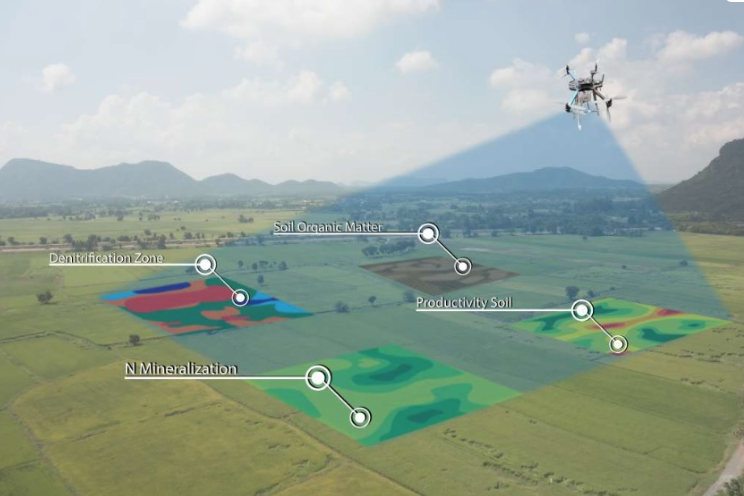“Harnessing Deep Learning to Grow a Greener, More Sustainable Future!”
Introduction
Deep Learning for Sustainable Agriculture is a relatively new field that is rapidly gaining momentum in the agricultural sector. It combines the use of advanced artificial intelligence (AI) and machine learning algorithms with traditional agricultural practices to create a more efficient and sustainable agricultural system. It has the potential to increase yields while reducing the use of resources, such as water and fertilizer. In addition, Deep Learning for Sustainable Agriculture can help farmers make smarter decisions about their crops and optimize their resources. This technology is also being used to detect pests and diseases, and to reduce the use of pesticides and other chemicals. This introduction provides an overview of Deep Learning for Sustainable Agriculture, its benefits, and its potential applications.
How Deep Learning is Revolutionizing Sustainable Agriculture
Deep learning is revolutionizing sustainable agriculture by providing powerful predictive insights and enabling automated decision-making that can improve the efficiency of agricultural processes. As an advanced form of artificial intelligence, deep learning applies machine learning algorithms to progressively analyze large datasets. This enables deep learning models to identify patterns and relationships in data, providing farmers with powerful insights into the health of their crops and livestock, as well as their environmental impacts.
By leveraging large datasets such as soil data, weather conditions, and crop yields, deep learning models can accurately predict crop yields, identify diseases and pests in crops, and even detect weeds in fields. This allows farmers to take preventive measures to protect their crops and fields, thereby increasing their yields and reducing their environmental impact. In addition, deep learning models can be used to identify the most efficient irrigation and fertilization methods for different types of crops, helping farmers optimize their water and fertilizer usage.
Deep learning models can also be used to monitor livestock health and detect diseases or parasites, helping farmers take proactive measures to protect their animals. Moreover, deep learning can be used to detect changes in animal behaviors, aiding farmers in recognizing signs of distress or other health issues in their animals. This helps farmers detect and address health issues early on, reducing the need for costly treatments and optimizing animal welfare.
Overall, deep learning is revolutionizing sustainable agriculture by providing powerful predictive insights and enabling automated decision-making. By leveraging large datasets and powerful machine learning algorithms, deep learning models can help farmers improve the efficiency of their agricultural processes and reduce their environmental impact.
Exploring the Benefits of Autonomous Farming with Deep Learning
Deep learning is an emerging technology that has the potential to revolutionize the way farmers manage their operations. Autonomous farming, which involves the use of robotics, machine vision, and artificial intelligence (AI) to automate agricultural processes, has become increasingly popular as a means of achieving greater efficiency, higher yields, and cost savings. In this article, we will explore the benefits of autonomous farming with deep learning and how it can help improve farming productivity and profitability.
Deep learning is a type of machine learning that uses artificial neural networks to process data. It is a form of supervised learning, meaning that the system is trained using labeled data. By using deep learning, farmers can create models to accurately predict and analyze the conditions of their crops and the surrounding environment. This allows for more precise control of the agricultural process, enabling farmers to respond quickly and effectively to changes in the environment.
The use of deep learning in autonomous farming can also help improve the accuracy and speed of decision-making. By analyzing data from sensors and cameras, deep learning can identify patterns and trends in the environment, allowing farmers to make decisions more quickly and accurately. This can help farmers optimize their operations, leading to improved yields and reduced costs.
In addition, deep learning can be used to automate some agricultural processes, such as the application of fertilizers and pesticides, or the collection and analysis of data from weather stations. This can help farmers save time and money while ensuring that their crops are properly cared for.
Finally, deep learning can help improve the safety of farming operations by reducing the risk of human error. By automating routine tasks, farmers can eliminate the possibility of accidents and injuries, leading to a safer working environment.
In conclusion, deep learning has the potential to revolutionize the way farmers manage their operations. By leveraging deep learning models to analyze data, automate processes, and improve decision-making, farmers can achieve greater efficiency, higher yields, and cost savings. With the help of deep learning, autonomous farming can help farmers improve their operations and increase their profitability.
Leveraging Deep Learning to Optimize Sustainable Crop Production
Deep learning is a powerful tool that can be used to optimize sustainable crop production. This advanced artificial intelligence technology uses artificial neural networks to learn from data and make informed decisions. Through deep learning, crop production operations can be tailored to the local environment, enabling producers to maximize yields and minimize impacts on the environment.
By analyzing large datasets such as soil types, weather patterns, and crop yields, deep learning models can identify the best practices and inputs to optimize crop production. These models can identify the most efficient planting times, the best varieties of crops to grow, and the optimal levels of fertilizer and irrigation. Additionally, deep learning can also be used to detect and diagnose pests, diseases, and other threats to crop health. This can help farmers take proactive steps to protect their crops and ensure successful harvests.
Deep learning can also be used to leverage big data and IoT sensors to monitor crop production in real-time. This can enable farmers to quickly identify and address problems, such as nutrient deficiencies or pest infestations. Furthermore, deep learning models can be used to forecast yield and optimize crop rotation. This can help farmers ensure that their soil is not overworked and that their crops are grown in the most sustainable manner possible.
Overall, deep learning has the potential to revolutionize sustainable crop production. By leveraging big data and predictive analytics, deep learning can enable farmers to maximize crop yields while minimizing their impacts on the environment.
The Role of Deep Learning in Improving Water Use Efficiency
Deep learning is a powerful tool that has been increasingly applied in a variety of fields, including agriculture and water management. By leveraging large datasets, deep learning models are capable of recognizing complex patterns and extracting meaningful insights from them. This technology has the potential to improve water use efficiency in agriculture by enabling farmers to better understand their water management practices and optimize them accordingly.
In agricultural irrigation, deep learning can be used to develop predictive models that can anticipate the amount of water needed for a particular field. The models can be trained on historical data, such as soil moisture levels, precipitation, and evapotranspiration, and can then be used to adjust the amount of irrigation for each field. Such models can significantly reduce water waste due to over- or under-irrigation.
Deep learning can also be used to identify water leaks and failures in the irrigation system. By analyzing sensor data, deep learning models can detect any anomalies in the water flow. This can help to identify potential water leaks or malfunctions that may otherwise go undetected.
In addition, deep learning can be used to monitor water quality. By analyzing data from water quality sensors, deep learning models can detect any changes in water quality and notify farmers of potential problems. This can help to identify potential sources of contamination and take prompt action to reduce the impact of pollutants on the surrounding environment.
By leveraging the power of deep learning, farmers can more accurately predict and monitor their water use and water quality. This can lead to improved water use efficiency, reducing the amount of water wasted while increasing the effectiveness of agricultural activities.
Achieving Sustainable Agriculture with Artificial Intelligence and Deep Learning
Sustainable agriculture is a critical issue facing the world today. With the population rising and the climate changing, it is essential to find ways to optimize crop yields and minimize environmental impact. Artificial Intelligence (AI) and Deep Learning (DL) have emerged as powerful tools to help achieve this goal.
AI and DL have the potential to revolutionize agricultural practices by helping to identify and mitigate risks, increase crop yields, and improve resource efficiency. By utilizing machine learning, predictive analytics, and data-driven decision-making, these technologies can assist in the efficient management of complex agricultural systems. For example, AI and DL can be used to identify and monitor plant diseases, pests, and other problems that negatively impact crop yields. Additionally, they can be used to detect patterns in weather and soil conditions that may affect agricultural productivity.
In addition to identifying and mitigating risks, AI and DL can be used to optimize production processes. By analyzing data from sensors and other sources, these technologies can identify ways to reduce water and fertilizer usage, improve crop yields, and reduce labor costs. Furthermore, they can be used to automate certain aspects of crop management, such as irrigation and harvesting.
AI and DL can also be utilized to improve the efficiency of agricultural supply chains. By analyzing data from each stage in the supply chain, these technologies can identify bottlenecks, improve logistics, and reduce food waste. Additionally, they can be used to provide valuable insights into consumer preferences and market trends that can help inform marketing and pricing strategies.
In conclusion, AI and DL have the potential to revolutionize sustainable agriculture. By utilizing predictive analytics and data-driven decision-making, these technologies can help identify and mitigate risks, optimize production processes, and improve the efficiency of agricultural supply chains. In doing so, they can help to ensure that our food systems are both sustainable and efficient.
Utilizing Deep Learning for Precision Agriculture and Sustainable Farming
Precision agriculture is an emerging concept that utilizes modern technology and data-driven precision farming techniques to increase crop yields while minimizing environmental impact. Deep learning, a subset of artificial intelligence, has recently been explored as a potential tool for leveraging the data generated by precision agriculture and increasing the efficiency and sustainability of farming operations.
The use of deep learning in precision agriculture has the potential to improve crop management, weed control, and nutrient management. For example, deep learning can be used to detect crop diseases and pests, monitor soil and water conditions, and detect changes in crop yield. Deep learning algorithms can also be used to predict weather trends, identify optimal planting and harvesting times, and optimize resource allocation.
Using deep learning for precision agriculture also offers potential benefits for sustainable farming practices. By automating the data collection and analysis process, deep learning can reduce the need for manual labor and help farmers make informed decisions about crop management. Deep learning can also be used to identify areas of land that can be used for sustainable production, such as organic or conservation farming, and to develop strategies for natural resource management.
Deep learning can significantly reduce the amount of time, energy, and money required for precision agriculture, as well as improve the accuracy and efficiency of the data analysis process. By providing farmers with accurate, real-time data, they can make informed decisions that will help maximize yields while minimizing environmental impacts. Deep learning could revolutionize precision agriculture and sustainable farming practices, allowing farmers to increase production while reducing their environmental footprint.
Conclusion
Deep Learning has the potential to revolutionize sustainable agriculture by providing a powerful and cost-effective tool to help farmers improve crop yields and reduce water and energy use. In addition, Deep Learning can be used to improve the accuracy and efficiency of precision agriculture, helping farmers to make informed decisions about their crops and land resources. Deep Learning can also be used to identify pests and diseases, reduce the use of chemical inputs, and improve the overall profitability of farming operations. The future of sustainable agriculture depends on the development and implementation of innovative technologies like Deep Learning.


